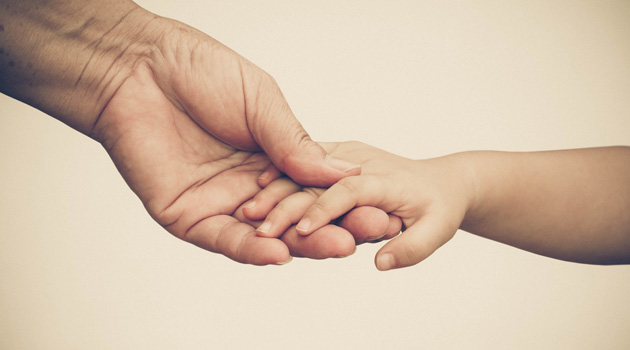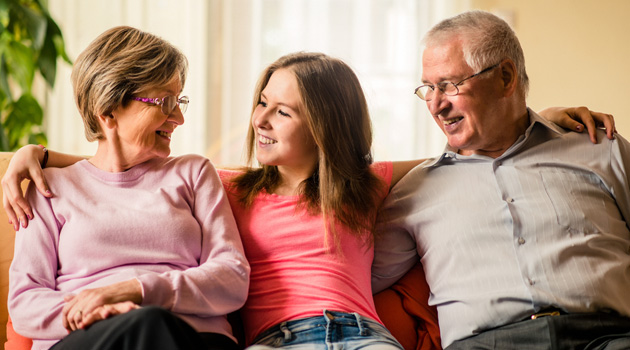What to buy for 18th birthdays?
Good Morning Saturday 20th April 2024
Another Tired Kicking For The Sick And Disabled By Rishi
What is a reasonable minimum spend for an online grocery delivery??


'Step-families' come in all shapes and sizes. Whatever your situation, being a step-grandparent can be extremely rewarding, but may also be a difficult road to navigate. Here's what you need to know about your new role, including tips on how to make the best of tricky family situations.
For more grandparenting tips, sign up to Gransnet now...
The role of grandparent and what it entails differs depending on the type of relationship you have with your step-grandchildren and their biological parents, and how involved you want to be in their lives. This may also be governed by the age of your step-grandchildren, how close they live to you, and even their biological grandparents.
The key is to be yourself - your relationship with your step-grandchildren may take some time to develop, so be open-minded and take a step back if needed. Trust and acceptance must be earned, not assumed.
You’ll soon create a role for yourself, one that may differ from the roles of other grandparents and step-grandparents, so don’t compare yourself to those in similar positions.
Gransnetters say:
"Each relationship is different, but take your cue from your step-grandchild's biological parent."
"Keeping the communication channels open means you will be more likely to have contact with them than if you try to assert yourself in some kind of 'position'. Children take to those who are kind, friendly and fun. Be that person."
"Connections depend on many different circumstances. If we never see a step-grandchild, then that child is a child to be welcomed and cared for if and when the occasion arises. It's hard to make a relationship at a distance."

While being a step-grandparent can be challenging, there are ultimately no set rules or codes of conduct. The trick is to take each day as it comes, assess the situation at hand and put as much effort as you can into building up a level of trust between you and your step-grandchildren. If, however, you're worried about drowning in a sea of step-grandparenting politics, some dos and don'ts may include:
Dos:
Don'ts:
Gransnetters say:
"My son has two teenage step-sons and no children of his own. While they do not regard us as grandparents, we seem to have found some common ground and have a good relationship. I think that is all you can hope for. Just be yourself, take an interest in them and let things develop at their own pace."
"Tread carefully. Allow the parents to make the moves and offer a little help. You can always increase this if it's welcomed."
"My advice is to not be judgemental in any way, ensure the parent can come to you for help if they need it, enquire after their health and that sort of thing in a friendly manner, but let them do things the way they want to without criticism. Get involved only so much as YOU want to, without feeling put upon. Works for me."
Join a community of over 300,000 users now...

As a step-grandparent, you may not feel like a ‘proper’ grandparent, which may lead you to wanting a grandparent name. Yes, being called ‘Gran’ or ‘Nana’ might make you feel a little more involved, but the relationship you have with your step-grandchildren is ultimately more important than this.
In the event that your step-grandchildren don’t want to call you by a grandparent name (which is common with children who have two sets of biological grandparents), try not to be upset or offended. This won’t mean that your role as a grandparent figure is any less important.
Try not to assume you’ll receive a grandparent title - it’ll just be a wonderful bonus if you do!
Gransnetters say:
"I have never been nor wanted to be Mum or Nan to stepchildren/grandchildren. They all call me by my first name which is fine with me. Just one step-grandson calls me 'Nanny Two' so he can differentiate. Don't get hung up on this - it's not a big issue in the grand scheme of things."
"Don't ask to be called 'Nana', but ask what they want to call you. Families have split up over who calls who what! My dear stepdaughter has four beautiful children, and we see them frequently and I babysit which is wonderful. Her mum sadly died before I met her father, so I just do my best to be there but not to intrude."
"Don't attach too much importance to being 'Nana'. You're not the child's grandmother so look at it from a different angle and just be a friend who is there for all of them if needed. It doesn't matter what you are called."
Make sure that you know and understand your role within the family dynamic so that you don't overstep any boundaries.
Building a strong relationship with the biological parent of your step-grandchildren is a great place to start, as this will assure them that you are trustworthy when it comes to offering support and caring for the child. This is especially important in cases where a child may have already had to negotiate a relationship with a step-parent. Change can be overwhelming for children no matter their age, so it is important to tread carefully and not to rush them, especially if the child is older.
The younger a step-grandchild is, the easier it is for you to fall naturally in their lives as a grandparent. Older children may take a little more time to accept you, so you may need to be a bit more patient, but it will be just as rewarding when they do.
It’s also vital to have a strong relationship with the children’s biological grandparents, and to let them know just how involved you’d like to be. If there are no other grandparents in the picture, just show the parents what a great grandparent figure you can be.
Gransnetters say:
"I would suggest you get the child's parents on your side. Ask if you can do anything to help. Confide in them. Tell them that you wish to be part of their lives and that you will take a lot of pleasure in being able to help out."
"Just enjoy the children. They will sort out the relationship as they go along. There is no competition if you don't make it one and don't join in if you feel there is a competitive vibe."
"The more the merrier I say, but then I have been a bit like the Pied Piper where kids are concerned. It takes a village to bring up a child."

First and foremost, don't worry. If you have biological grandchildren, it's only natural to be more attached to them and to even feel conscious that your step-grandchildren 'aren't yours'. But, try to be open-minded about getting to know and growing fond of them.
Don't feel guilty if it takes a while for you to adjust to having step-grandchildren, and remember that relationships take time to evolve. You're certainly not alone.
However, make sure that you do not overtly exercise favouritism - make sure all your grandchildren, step or biological, feel as loved and as cared for as each other. This includes gift giving and the amount of time you spend with each child.
Gransnetters say:
"It's very difficult coping with all the emotions involved in blended families, but we just have to do our best."
"Never blame the child. Treat them just the same, even if you feel differently about them."
"It's human nature. The trick is not to let the child know - it's not their fault of course. Put the child first."
There is no rule for this - just do whatever feels natural and what works for you and the family best. If you have both biological and step-grandchildren, try to not feel self-conscious if you do treat them differently. However, if an issue does arise, make sure to accept responsibility and make the changes necessary to resolve it.
Also be open to the fact that you may find yourself getting attached to your step-grandchildren (the more love the better!), as that's perfectly okay too.
Gransnetters say:
"I'm a step-grandma and my husband is a step-grandfather. We dote on the step-grandchildren just as much as their biological grandparents do. I don't think it's blood that makes a family but love. Children who have loving step-parents and step-grandparents are surrounded by love and that's all that matters."
"I think I was a bit afraid that I wouldn't feel the same as I do for my natural grandchildren, but the first time I set eyes on their beautiful baby girl I felt a great rush of love for her."
"As far as I am concerned, the more adults there are around to love a child, the better."
For more first-hand grandparenting tips and advice, head over to our forums.
Images: Shutterstock